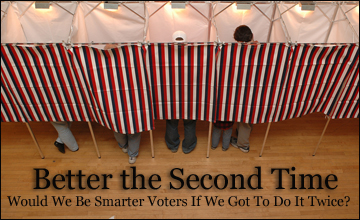Better the Second Time
Better the Second Time
tk
I think that everybody, not just the Democrats who live in Florida and Michigan, should get to vote twice. The first time in haste, the second in tranquility. We can vote our prejudices the first time, our interests the second—or, we can think about ourselves and our families the first time, our country the second. It would be extremely useful just to find out the different motives at play in the two votes.
 I know that I have second thoughts about most things, and I expect that lots of people are like that—so, given the importance of elections, why shouldn’t second thoughts find expression in second votes? We could count the two equally, or (my preference) we could discount the first (by 25 percent, say), or we could count only the second, on the assumption that it was more reflective and more rational.
I know that I have second thoughts about most things, and I expect that lots of people are like that—so, given the importance of elections, why shouldn’t second thoughts find expression in second votes? We could count the two equally, or (my preference) we could discount the first (by 25 percent, say), or we could count only the second, on the assumption that it was more reflective and more rational.
But equality is very important; the two vote option has to be for everybody. The turnout might be different the first and second time (when would it be higher?), but everybody has to have the same chance: one person, two votes. Long ago, John Stuart Mill proposed giving a double vote to university graduates—they would vote just once, but be counted twice. Mill’s proposal seems to me a very bad idea. University graduates are as likely as anyone else to be hasty, prejudiced, and self-regarding. Most of the time, they vote slightly to the right of high school graduates, in line with their social class. If they actually voted twice, they might improve, but that is true for everyone.
None of us does all that well the first time around; we are clumsy, nervous, overwrought; or we are lazy, paying no attention until the very last minute, and then rushing to a decision. Think of all the things we do better the second time: taking the SATs, getting married, reading War and Peace. Imagine a second vote in 2000: in all likelihood Bush would have been defeated—and not just because second-time voters in Florida would have known how to mark the ballot. Mastering the mechanics of voting is a small thing, though not inconsequential. But the opportunity to think again, knowing how things went the first time, that has to make a big difference.
And it will make an even bigger different if the second-time vote is mandated to come after a week without political noise: no stump speeches, no debates, no press conferences, no ads, no phone calls, no ringing doorbells, no gotcha! revelations. A week of quiet, and then a second chance. I bet we would do better.
Michael Walzer is the co-editor of Dissent. Photo: Nate Shepard (Flickr / Creative Commons).






